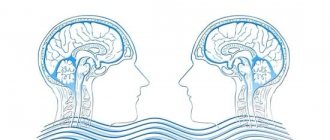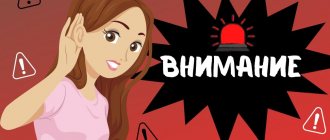Often in childhood we hear such phrases: “How inattentive you are!”, “You always ignore everything!”, “You don’t remember anything, like old people,” and something like that.
And due to their young age, for many these phrases sound like a sentence. A person forever remembers that he is incapable of concentrating on anything, that such professions as a machinist, pilot, intelligence officer, surgeon or even programmer do not shine in his life. Because of this, such a teenager’s subconscious choice may fall on the humanities, even if he has good abilities in natural science, technical and mathematical disciplines. This is how one categorical remark from a parent or teacher can affect the fate of a child or student as a whole.
After all, the child does not understand that attentiveness is something that can be developed in oneself, and the situation, often momentary, can be turned in one’s favor. A negative assessment from an adult can only concern a specific moment, but the unquestioned authority of an elder can elevate it to an absolute. The little man has nothing to oppose, he does not yet have the opportunity to refute comments with reason, and sometimes he is not allowed.
But something needs to be done about it, and before you give up on your career because you “have had sclerosis since childhood,” you can turn the situation in the right direction. But first you need to understand whether the concept of mindfulness is static when applied to a specific person and whether it will really be possible to develop it?
What is attention
Attention is one of the main human cognitive functions. In psychology it has a special role. This is a kind of filter through which all surrounding information passes. For clarity, it can be compared to the beam of a flashlight or spotlight, which focuses light on a specific object, leaving everything else out of sight.
The quality of other cognitive functions – thinking and memory – depends on the quality of attention. It happens that we scold ourselves for forgetfulness, we try with all our might to develop memory, while it has absolutely nothing to do with it. It’s just that at the moment of perceiving the information, our attention wandered somewhere in the vastness of space, so nothing entered our memory.
At some moments, failure to concentrate can cost us our lives. For example, while driving a car.
There are professions that require extreme care: air traffic controller, train driver, watchmaker. They become not some geniuses who have ideal attention by nature, but ordinary people. If they managed to bring the skill of concentration to perfection, then you and I can do it too. Regular training will help you “pump up” your attention muscle and thereby increase your productivity.
Organize your workspace and your home
Clutter at work or at home can cause anxiety and stress. Getting organized is an easy way to reduce stress and improve your quality of life. Also, in the process of organizing, you improve your attentiveness, since you have to sort out each of your things separately.
Concentration, switching and distribution of attention
Before moving on to practical recommendations and exercises, I will tell you what exactly you can train and how. There are three aspects of attention that you need to learn to master.
- Concentration is the ability to direct all your attention to one specific object or action. The better your ability to concentrate, the longer you can work without distraction.
- Switching is the ability to quickly change objects of attention. You've probably noticed that when there is a sudden change in activity, it is difficult for the brain to immediately readjust. This is especially true for anything associated with strong emotions.
For example, you come home from work, where you just had an argument with your boss, and are trying to play with the children. But my thoughts continue to revolve around the unpleasant situation.
- Distribution of attention plays an important role when we need to perform several actions at once and control several objects. The best training for this is driving. Remember what driving a car is like. You need to constantly monitor the road, change gears, squeeze the clutch, turn on the turn signals... At first it seems impossible, but then it turns out automatically.
It is very important to train all three aspects of attention. Our recommendations and exercises are aimed precisely at this.
Courses
To learn something, you need to turn to a person who already knows how to do it. To develop your cognitive processes, you need to learn ready-made effective programs. There are excellent attention courses that will effectively improve your skills.
Development of attention from Vikium is an online course that consists of 15 lessons, includes 11 simulators and audio materials to calm the nervous system. At the moment, its cost has decreased to 1,490 rubles. instead of 2,490 rub.
What you will get after training:
- Increased concentration and speed of switching attention.
- Ability to effectively focus on tasks.
- You will be able to improve control over your own activities.
- You will be able to forget about absent-mindedness and minor mistakes forever.
The course for developing attention from Brian Apps is 7 interesting lessons, 10 simulators, you are offered introductory and final tests to view the dynamics, an adaptive program for you.
What does training provide:
- Increased performance through concentration.
- Quickly switch from one activity to another.
- Prolonged concentration on one object.
- Working with large amounts of information.
- Focus on a few objects.
- Bringing all started tasks to completion.
The price for training is now 490 rubles.
Why do we get distracted
Let's highlight the main reasons why we find it difficult to concentrate.
More than 100 cool lessons, tests and exercises for brain development
Start developing
Lack of willpower
Willpower in simple words is the ability to control your attention. Concentrate on what is important and cut off what is unimportant. Therefore, by developing willpower, you simultaneously improve the quality of your attention.
Discomfort
Uncomfortable posture, pain, hunger - all these are distractions that draw attention to themselves. You are probably aware that our brain processes body signals first. Therefore, before starting work, try to eliminate all these interferences.
A bunch of unsolved cases
It is very difficult to concentrate when many problems hang over you like a sword of Damocles. Even if you don't think about them at a particular moment in time, they still loom somewhere on the periphery of your consciousness. Start raking them slowly - time management will help you.
Recommendations for developing attention
Now we can finally consider specific ways and means of improving attention. They are perfect for teenagers and adults.
Give yourself extra motivation
Have you noticed that when you are doing something interesting and enjoyable, you do not need to hold your attention on purpose. On the contrary, you cannot tear yourself away from your favorite activity and switch to something else. How can this effect be transferred to all other matters?
The right attitude is very important. Every time before you start doing something, think about why it is important to you and what benefits it will ultimately bring. For example, when starting cleaning, imagine in bright colors how your apartment will shine after a couple of hours. At each stage, reward yourself for the work done. Once you've washed the floors, you can eat some candy and move on.
Concentrate on your feelings
It is very convenient to develop concentration through the senses. During the day, be distracted for 10-15 minutes and concentrate on the sensations of one modality. For example, when getting to work in the morning, look carefully around, try to remember as many details as possible and not miss anything.
During your lunch break, focus on eating. Feel the taste of every piece of food, try to recognize every ingredient. Also take time for auditory and kinesthetic sensations. If you can develop this habit, you will not only improve your concentration, but also begin to live a more conscious life.
Get rid of distractions
Imagine that you suddenly find yourself in a locked, empty room without the Internet, alone with your work laptop. How much do you think your efficiency will increase under such conditions? Scientists from the University of Massachusetts conducted a similar experiment. As a result, the subjects' productivity increased by an average of 25%.
This means that the work that they usually did in 8 hours of the working day, while locked up, they managed to do in 6. It turns out that on average, people waste 2 hours every day to no one knows where.
Observe yourself and determine what you are most often distracted by. I bet it's social media, chatting with colleagues, snacks and cigarettes. Set yourself a limit on these actions and strictly adhere to it. At the same time, you will train your willpower.
Get used to order
We have already found out that our environment greatly influences our ability to concentrate. If your surroundings are chaotic, it will be very difficult for you to concentrate on completing a task. There are two reasons for this.
Firstly, scattered things, dust and dirt will catch your attention like hooks and pull it towards you. The visual analyzer dominates over all others, so the abundance of visual stimuli is always very distracting.
Secondly, you will not be able to get rid of internal discomfort until you put things in order. A mess is always annoying, depressing and oppressive. So before you begin an important task that requires extreme concentration, take some time to clean up.
Meditate
Distractions can be not only external, but also internal. Somehow, for fun, observe the flow of your thoughts. Starting to think about the recipe for the upcoming dinner, after 10 minutes you can easily catch yourself thinking about the design of the hadron collider. And all because we are not used to maintaining discipline and mental hygiene.
Meditation will come to the rescue. Start devoting 15 to 30 minutes a day to it, and within two weeks your mind will become clearer, your consciousness will be clearer, and your attention will be sharper.
Determine your work/rest schedule
There is a method in time management called 90/30. Its essence is that a person should work intently on one task for 90 minutes, and then rest for half an hour. It is believed that 90 minutes is the maximum concentration time that our brain is capable of. Then he begins to spontaneously become distracted.
90 is an approximate value. It varies from person to person. There are people with so-called childlike attention - their brain constantly jumps from one task to another. Working with concentration for an hour and a half is an impossible task for them. Therefore, you should determine the optimal time for yourself.
Next time you're concentrating on something, set a timer. Ignore the first attempts of the brain to be distracted - continue working. When your willpower can no longer cope with the attempts of your consciousness to fly somewhere away from your boring work, record the time. Allow 10 to 30 minutes for rest, depending on the duration of the period of concentration.
Learn to ignore
No matter how paradoxical it may sound, for the development of attention it is very important to turn it off sometimes. Namely, in those moments when it tries to focus on an unwanted stimulus.
For example, you are working on a quarterly report, and a cheerful summer song comes from the window. And now you are already dancing with all your thoughts on vacation on the sea coast with a cocktail in your hands. What kind of report is this?
It is very difficult to deal with emotionally charged stimuli, but it is possible. If possible, it is best to get rid of them: in our case, close the window so as not to hear tempting sounds, or insert earplugs.
If this is not possible, you will have to use your will. Tell yourself that you only have a little time left before your vacation. But if you don’t work hard now, then what awaits you is not the sea coast, but, at best, a sofa and a TV.
Give up the habit of doing things halfway
We very often do things inattentively and half-heartedly. We communicate with children when our minds are busy with work, we eat while staring at the phone screen, we watch a movie, but we think about something else. This is a very harmful practice. Our brain relaxes and thinks that we can’t concentrate at all.
If for some reason you cannot devote yourself completely to your activity, it is better to postpone it. There will be no sense in doing it “halfway” anyway.
Exercises
You can develop attention with the help of special exercises. The main principle is regularity. It is better to study for 5 minutes every day than to complete all tasks at once and put it off indefinitely.
Schulte table
A classic exercise for developing attention. Look at the table below and try to fix the numbers with your eyes in the correct order from 1 to 25 as quickly as possible. You can make the task more difficult. Do the same, placing your gaze in the center of the table and using only your peripheral vision. By the way, this technique is used in speed reading courses.
Stroop table
In front of you is a table with words of different colors written on it. Your task is to name the color of each word in turn. It will be difficult at first, but don't give up! Practice until you name all the words quickly and without a single mistake. When you have mastered this particular picture, find a similar one on the Internet. By the way, children do this much better than adults.
Finding differences
One of children's favorite educational toys is a great way to train attention. Look at the pictures and try to find as many differences as possible. To make the task more difficult, you can do this for a while.
Drawing with two hands
The main goal of this exercise is to develop both hemispheres of the brain. But it is also perfect for training attention. Take a pencil in your hands and start drawing different geometric shapes at the same time. For example, with your left hand you use a square, and with your right hand you use a circle. It's best to do this temporarily. Try to draw at least 8-10 shapes in a minute. But don’t forget about quality!
ticking clock
This exercise trains the skill of switching from one stimulus to another. You will need a clock with a ticking mechanism and a book. Place the clock in front of you on the table, pick up the book and start reading. Read very intently for 10 minutes, without any distractions. Then quickly turn your attention to the sound of a clock ticking.
Try not to think about what you read, but focus completely on your auditory sensations. After 10 minutes, switch back to the book and do a few more of these approaches.
Do this exercise every day. After a week, you can replace the book and watch with something else, for example, music and typing on a computer, drawing and watching movies, etc. You should also try to increase the time you concentrate on each stimulus.
Warm glass
Pour warm water into a glass, take it in your hand and stretch it horizontally forward. Your task is to focus on holding your hand in one position for a few minutes. Then bring your attention to your palm. Feel the warmth and concentrate on it, while trying not to lose the original position of your hand. Shift your attention back and forth several times in a row. As your hand gets tired, it will become more and more difficult for you to concentrate on the sensation of warmth.
Mini tips for every day
What else can help develop attention besides special exercises and techniques? Useful habits. They are so simple and easy that you can easily fit them into your life.
- Develop your powers of observation. Walking down the street, try to notice as many details as possible. Remember what trees grow in your yard, what hairstyle your neighbor Masha has, what color the cars passing by are.
- Do the same when going to the store. Try to remember how the display cases are located and what products are displayed on them. When you get home, recreate the picture in your mind in all details.
- When communicating with people, note how they look: what they are wearing, what color their eyes are, what shape their eyebrows are, etc.
- Stop doing everything “automatically”! Practice mindfulness. Learn to live here and now and enjoy every moment.
Help someone
Research shows that people who help others live more successful lives. They are also less likely to experience stress and depression. Every gesture of attention will be useful: help your family members, help an elderly person cross the road. By doing a small favor for another person, you increase your self-esteem. It makes your life a little better. You realize the purposefulness of life.
Useful literature
I really like exercises to develop attention - they are simple and unobtrusive, but at the same time exciting. And most importantly, the effect comes quite quickly. If you, like me, want to study seriously, I advise you to purchase special books. They describe various methods for developing attention and present a wide selection of exercises.
For adults:
- “Theories of attention” Alexander Shevtsov
- “#The power of focus. Metaphysical law of success” Niko Bauman
- “The brain is in good shape. Workbook for training memory and attention” Tetsuya Miyamoto
- “How to quickly concentrate attention” Ilya Melnikov
- “How to improve memory and develop attention in 4 weeks” Tatyana Lagutina
For children:
- “School of Attention” Natalia Pylaeva, Tatyana Akhutina
- “350 exercises for developing logic and attention” Olga Uzorova, Elena Nefedova
- “Development of attention and memory with a neuropsychologist” Alexander Sobolev
- The Big Book of Attention Training
- “We train attention. Simple exercises and games” by A. M. Kruglova
For a detailed review of the literature, see the article “Books on developing attention.”
Games
Helps improve the process of selecting game information. These can be computer games or on the phone, as well as joint children's games for schoolchildren or preschoolers in kindergarten.
On the logiclike website you will find 15 games for developing children's attention. Here you can choose ages 5–8, 9–14 years and from 15. After choosing a class, you will see starting blocks. After completing them, you will begin more complex games. You can go through them yourself or with your child.
Games for children on the “Let's Play” website - you need to find, mark or avoid something. Children will have a lot of fun going through the mazes and finding the differences.
Games for attention
Online trainers for developing attention
There are many services on the Internet for developing brain functions, including attention. I'll introduce you to four of my favorites. All of them are designed according to the same principle - some of the simulators are available for free, but you will have to pay for extended access.
Vikium
Vikium is the most popular training service for brain development today. There you will find exercises and games to develop attention, memory, thinking, and logic. Today there are more than forty of them. The exercises are quite simple, so you can easily fit them into your daily schedule, doing them, for example, during breaks between work.
Bitreynik
On Bitreynik you can focus only on developing attention, or you can train all cognitive functions in a complex. In addition to the exercises themselves, there are many interesting features, for example, tournaments among participants, tests. The tasks are different: some are simple, and some are quite complex.
BrainApps
On the BrainApps service you will find 52 simulators, 18 of which are aimed at training concentration skills. Among them are Schulte tables, tasks for sorting, comparing and searching for shapes. Also on the site you can take various courses, including those on developing attention.
CogniFit
The creators of CogniFit claim that with the help of the service you can not only improve brain performance, develop logic, attention and memory, but also correct some disorders, such as ADHD, insomnia, multiple sclerosis and even the consequences of a stroke. There are programs for both children and adults, as well as a special section for health professionals.
Medications
How to increase your concentration? There are several effective pharmaceutical products that have almost no or minor side effects.
- Glycine is a popular drug, especially among students. It relieves stress and increased nervous excitement, improves brain performance.
- Vitrum Memory is recommended to be taken if intellectual abilities and attention deteriorate. This herbal medicine supplies the brain with oxygen, increasing blood circulation in this organ.
- Undevit - a dragee based on a complex of vitamins A, B, C, E, P, produces a versatile effect.
- Aminalon restores nervous processes and removes toxins that form in the brain from the body.
- Bilobil is recommended for insomnia and decreased intelligence, as well as for getting rid of fear and anxiety. The drug improves oxygen supply to the brain.
- Intellan is a herbal preparation useful for depression, decreased intellectual capabilities and forgetfulness.
- Ginkgo biloba is recommended for memory and attention, insomnia and dizziness.










